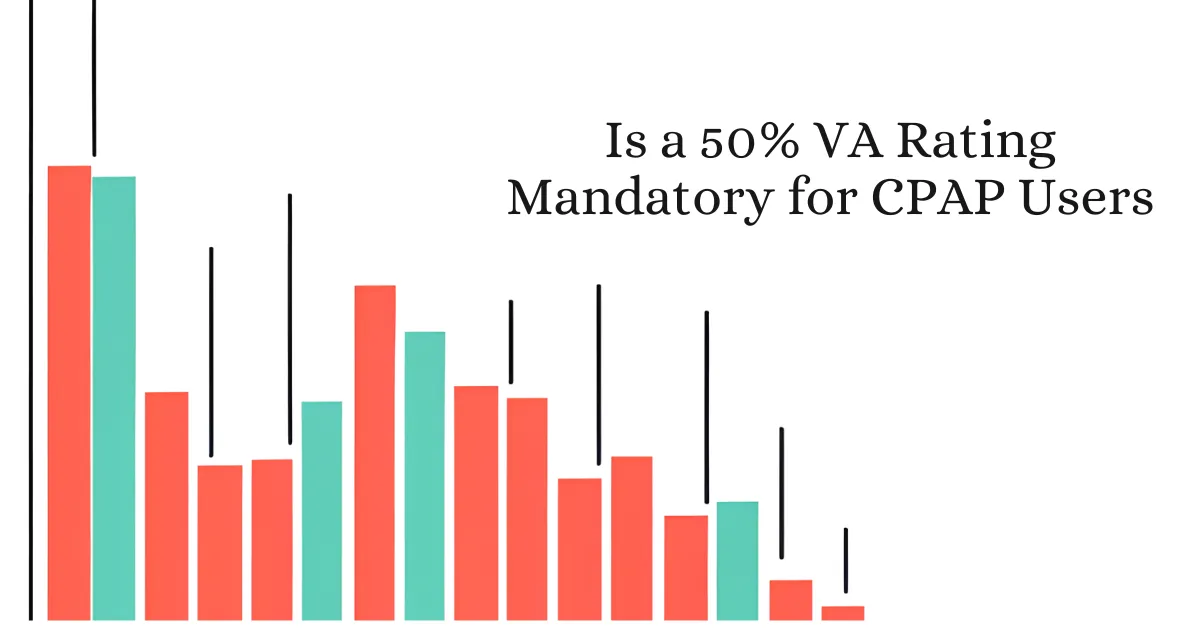Sleep apnea is a common condition among veterans, often linked to service-related factors like exposure to dust, chemicals, or injuries. If diagnosed, you might wonder whether using a CPAP machine automatically qualifies you for a 50% VA disability rating.
The VA does assign a 50% rating to some CPAP users, but it’s not guaranteed. Your rating depends on the severity of your condition and the medical evidence provided in your claim.
Understanding how the VA evaluates sleep apnea and what qualifies for a 50% rating can help ensure you receive the compensation you deserve.
Understanding VA Disability Ratings for Sleep Apnea
The VA rates sleep apnea under Diagnostic Code 6847, which falls under the respiratory system. The ratings are assigned based on the severity of symptoms and required treatment:
- 0% Rating – A diagnosis of sleep apnea with no significant symptoms.
- 30% Rating – Persistent daytime sleepiness caused by sleep apnea.
- 50% Rating – A CPAP (or similar device) is medically required for treatment.
- 100% Rating – Sleep apnea causes serious health complications, such as chronic respiratory failure or heart failure.
The key to qualifying for a 50% rating is proving that your CPAP is required for your condition, not just recommended.
Veterans who are diagnosed but not prescribed a CPAP typically receive 30% or lower. A 100% rating is rare, as it requires evidence that sleep apnea has led to life-threatening complications.
Understanding these criteria can help you determine where your condition falls within VA guidelines and what evidence is needed for a successful claim.
Is a 50% VA Rating Guaranteed for CPAP Users?
Many veterans assume that being prescribed a CPAP automatically guarantees a 50% rating, but this isn’t always the case. The VA considers several factors before awarding a disability percentage.
To qualify for a 50% rating, you must provide clear medical evidence that your CPAP is necessary for treating your condition. This usually includes:
- A confirmed diagnosis of sleep apnea from a VA-approved sleep study.
- A doctor’s statement explaining why a CPAP is required.
- Evidence that you are actively using the CPAP as prescribed.
However, some veterans with CPAP prescriptions still receive a lower rating. This can happen if:
- Your medical records don’t clearly state that CPAP use is mandatory.
- The VA examiner disagrees with the necessity of the CPAP.
- The C&P exam results suggest your symptoms aren’t severe enough for 50%.
If you receive a 30% rating instead of 50%, you may need to appeal the decision or submit additional evidence. Ensuring that your doctor’s notes, sleep study results, and VA exam findings all align is crucial to securing the correct rating.
Proving the Need for a CPAP in Your VA Claim
When filing a VA claim for sleep apnea, simply having a diagnosis isn’t enough to secure a 50% rating. The VA requires clear medical evidence proving that your CPAP is medically necessary.
Sleep Study Report
The most important document is a comprehensive sleep study conducted by a VA-approved provider or a private specialist. This study should confirm that your oxygen levels drop significantly during sleep and that a CPAP is the recommended treatment.
Doctor’s Prescription
Additionally, a doctor’s prescription explicitly stating that CPAP use is required, not just suggested, strengthens your case.
VA examiners may reduce your rating if the documentation is unclear or if alternative treatments (like weight loss or lifestyle changes) are mentioned as options.
C&P Exam Report
Your Compensation & Pension (C&P) exam also plays a major role. If the examiner downplays your symptoms or questions the necessity of a CPAP, it can hurt your claim.
Be sure to describe the severity of your sleep apnea symptoms, including extreme fatigue, memory issues, and any daytime impairments.
CPAP Compliance Records
Lastly, keeping records of CPAP compliance data (showing consistent use of the machine) can help validate your claim.
Some veterans find that submitting buddy statements from a spouse or roommate describing loud snoring, choking episodes, or breathing interruptions during sleep adds further credibility.
How to Increase Your VA Sleep Apnea Rating
If your VA sleep apnea rating is lower than expected, you may have options to increase it. Whether you were assigned 30% instead of 50% or believe your condition has worsened, providing additional evidence is key.
The first step is to review your denial letter or rating decision. This will explain why you received a lower rating. If the VA states that your CPAP use wasn’t proven to be medically required, you may need to submit a doctor’s statement reinforcing its necessity.
You can also request a higher-level review or file a supplemental claim with new evidence, such as:
- A more detailed sleep study report emphasizing the severity of your condition.
- A second medical opinion confirming that CPAP therapy is essential.
- Updated medical records showing worsening symptoms, such as daytime drowsiness or heart issues.
If your sleep apnea has progressed, you can also file for an increase based on worsening symptoms. Veterans experiencing complications like chronic respiratory failure or heart conditions may qualify for a 100% rating.
Additionally, if you were denied a CPAP initially but later prescribed one, you may be able to appeal for a retroactive rating adjustment. Keeping track of your medical history and submitting strong supporting evidence is the best way to improve your VA rating.
Conclusion
Getting the correct VA disability rating for sleep apnea requires strong medical documentation, a clear CPAP prescription, and accurate symptom reporting. While a 50% rating isn’t automatic, proving that your CPAP is medically required can significantly improve your chances.
If you received a lower rating than expected, appealing the decision with additional evidence or requesting a reevaluation can help. Ensuring that your C&P exam, doctor’s notes, and sleep study results align is crucial.
